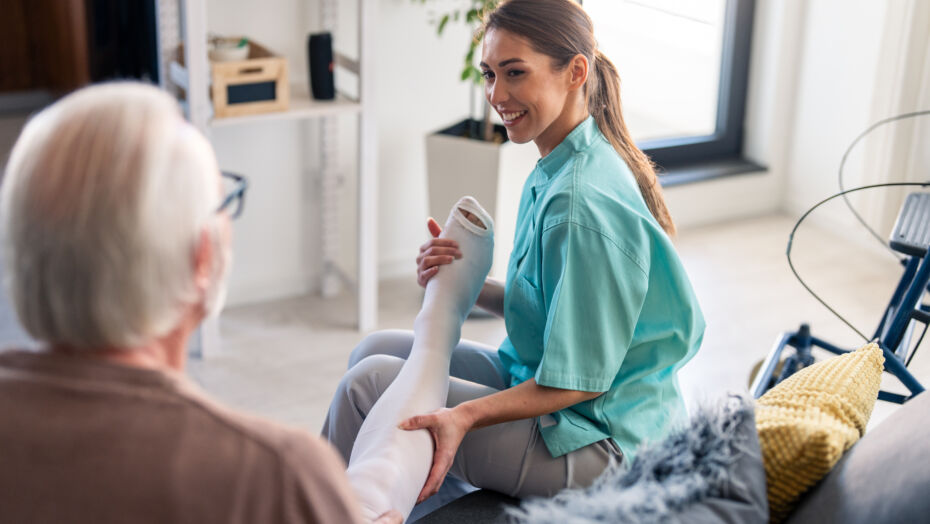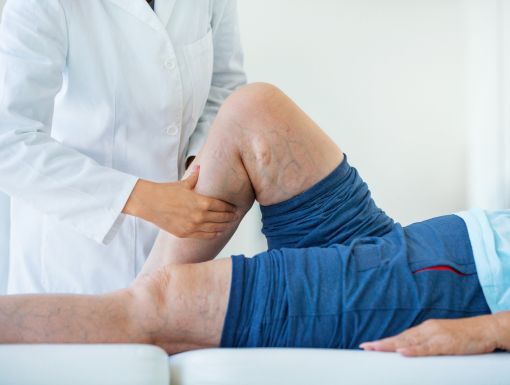
How Do Compression Socks Help Blood Flow?
Compression socks are simple, yet effective garments that can boost circulation, reduce the risk of blood clots and ease discomfort. Whether you’re managing a medical condition, battling travel fatigue or just looking to support your overall well-being, understanding their benefits can help you decide whether to consider wearing them.
What are compression socks?
Compression socks, also known as compression hose, are specialized stockings designed to improve blood flow in the lower extremities. They apply pressure that is strongest at the foot and ankle and decreases as it moves up the leg. This controlled pressure helps blood flow more efficiently back to the heart, minimizes blood pooling, reduces swelling and alleviates fatigue.
Unlike standard socks, compression socks serve a medical or performance-focused purpose. They’re carefully crafted from durable, elastic materials like nylon and spandex to maintain optimal compression levels while ensuring comfort. These socks can aid patients with circulation issues, frequent travelers and athletes looking to boost recovery.
By supporting vascular health, compression socks contribute to managing and preventing conditions like varicose veins, deep vein thrombosis (DVT) and chronic venous insufficiency. Compression socks are more than just supportive wear. They’re a proactive choice for enhancing overall lower-limb health.
How do compression socks work?
Compression socks rely on the principle of graduated compression, using strategic pressure to enhance venous blood flow. Here’s how it works:
Reduced venous pooling: By compressing veins in the legs, these socks encourage blood to flow upward, countering the effects of gravity.
Enhanced blood velocity: The applied pressure increases blood flow speed, preventing clots and reducing swelling.
Alleviation of discomfort: For those with circulatory issues or prolonged fatigue, compression reduces heaviness and leg fatigue.
Compression socks can be good for people who spend long hours standing or sitting because they push deoxygenated blood toward the heart while allowing oxygenated blood to return to the legs.
The science behind compression socks is robust, with numerous studies supporting their impact on venous health.
What are the benefits of compression socks for blood flow?
The benefits of wearing compression socks extend beyond immediate comfort. They can enhance health and well-being by:
1. Preventing blood clots and varicose veins
Graduated compression reduces pressure on veins, preventing the pooling of blood that leads to clot formation or visible varicose veins. This is particularly vital for individuals at high risk of DVT.
2. Providing relief during travel
Compression socks combat the inconvenience of swollen feet and the serious risk of DVT during long-haul traveling. By maintaining circulation, they help travelers feel refreshed on arrival.
3. Improving comfort for daily life
For anyone who spends hours standing or sitting, compression socks significantly reduce discomfort and fatigue, allowing a more productive day.
4. Promoting faster muscle recovery
Athletes can benefit from post-exercise recovery by wearing these socks. Enhanced blood transport ensures faster removal of lactic acid and better delivery of nutrients, speeding up muscle repair and reducing soreness.
Who should consider wearing compression socks?
Compression socks are versatile and beneficial for a range of people, including:
Medical patients: People with venous disorders, such as varicose veins or DVT, can manage their condition more effectively with compression socks. The targeted pressure can reduce swelling and improve overall leg health.
Frequent travelers: Long-haul flights or car rides often cause swelling and elevate the risk of clots. Compression socks ensure proper circulation throughout these extended periods of sitting.
Professionals who stand or sit all day: Whether it’s nurses on their feet for 12-hour shifts or office workers glued to their desks, compression socks provide support and comfort.
Recreational Athletes: Runners, cyclists and gym-goers gain an edge in both performance and recovery by boosting blood flow to oxygenate muscles and reduce soreness.
How do you choose the right compression socks?
When selecting compression socks, take the following into consideration to ensure optimal results:
1. Compression level
Measured in mmHg (millimeter of mercury), compression levels vary based on intended use.
8–15 mmHg: Suitable for daily wear or minor discomfort.
15–20 mmHg: Ideal for mild swelling, varicose veins, or travel-related use.
20–30 mmHg: Recommended pressure level proven to help patients in research studies.
2. Correct sizing
Socks should feel snug but not restrictive. Measure your ankle and calf circumference for an accurate fit using the brand’s size chart. Incorrect sizes can impact effectiveness or cause discomfort.
3. Material and comfort
Look for durable, breathable materials like spandex or nylon. These ensure lasting wear and prevent overheating during prolonged use.
4. Seek professional guidance
If you have underlying health conditions, consult with a healthcare provider to determine compression level and duration of wear.
What are the possible side effects and precautions of using compression socks?
Compression socks are typically safe but may cause minor reactions if not used correctly. Here’s what to watch for:
Poorly fitting or extended wear of socks can lead to skin irritation, causing redness or itching. Wearing socks that are too tight may impair circulation, leading to tingling or discomfort. Additionally, ill-fitting socks or incorrect compression levels can worsen symptoms, resulting in swelling or pain.
Certain groups should consult a healthcare professional before use, including individuals with:
Peripheral arterial disease
Severe infections around the legs
Advanced heart problems or circulatory blockages
Compression socks offer a smart, effective solution for managing circulation issues, reducing the risk of blood clots, and enhancing comfort. Before buying a pair of compression socks, follow your doctor's recommendations on compression levels, limit wear to designated time periods and regularly inspect your legs for irritation or changes.
Learn more about vascular and endovascular surgery at Ochsner Health


